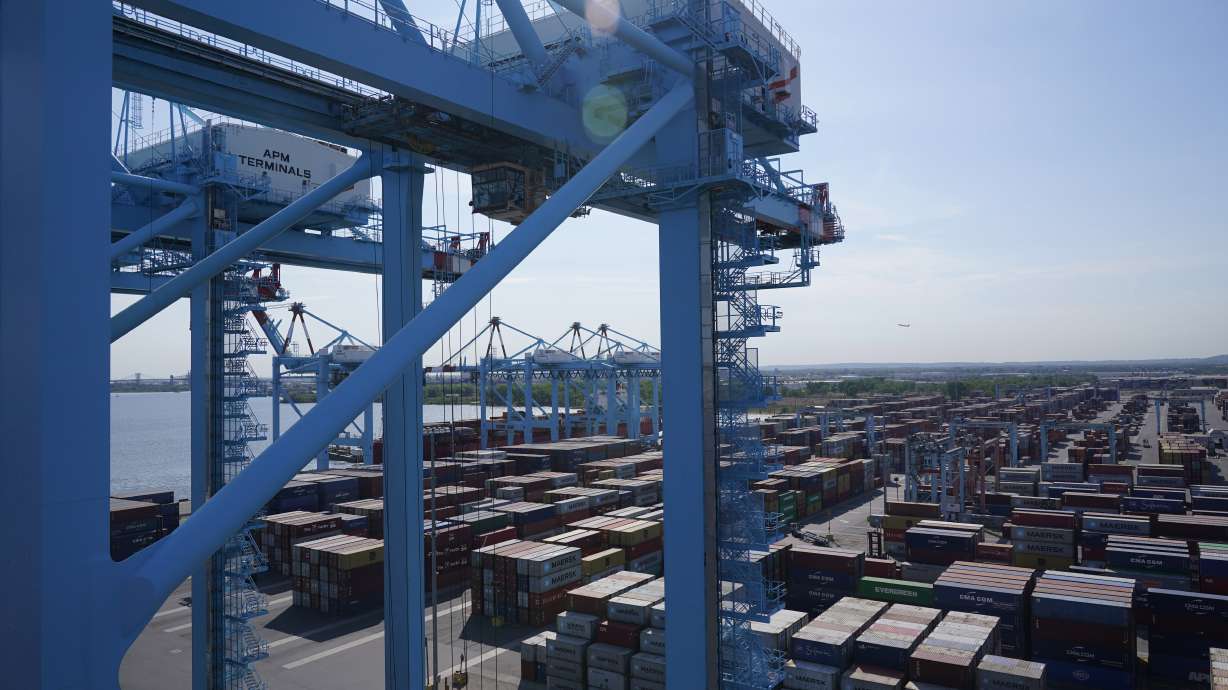Estimated read time: 3-4 minutes
This archived news story is available only for your personal, non-commercial use. Information in the story may be outdated or superseded by additional information. Reading or replaying the story in its archived form does not constitute a republication of the story.
NEW YORK — The union representing U.S. dockworkers has signaled that 45,000 members will walk off the job at midnight, kicking off a massive strike likely to shut down ports across the East and Gulf coasts.
The coming work stoppage threatens to significantly snarl the nation's supply chain, potentially leading to higher prices and delays for households and businesses if it drags on for weeks. That's because the strike by members of the International Longshoremen's Association could cause 36 ports — which handle roughly half of the goods shipped into and out of the U.S. — to shutter operations.
The association confirmed over the weekend that its members would hit the picket lines at 12:01 a.m. Tuesday EDT. In a Monday update, the union continued to blame the United States Maritime Alliance, which represents the ports, for continuing "to block the path" toward an agreement before the contract deadline.
"The Ocean Carriers represented by USMX want to enjoy rich billion-dollar profits that they are making in 2024, while they offer ILA Longshore Workers an unacceptable wage package that we reject," the longshoremen's association said in a prepared statement. "ILA longshore workers deserve to be compensated for the important work they do keeping American commerce moving and growing."
The International Longshoremen's Association also accused shippers of "gouging their customers" with sizable price increases for containers over recent weeks. The union said that this will result in increased costs for American consumers.
The Associated Press reached out to a United States Maritime Alliance spokesperson for comment.
If drawn out, the strike would force businesses to pay shippers for delays and cause some goods to arrive late for peak holiday shopping season — potentially impacting the delivery of anything from toys or artificial Christmas trees, to cars, coffee and vegetables. Americans could also face higher prices as retailers feel the supply squeeze.

"If the strikes go ahead, they will cause enormous delays across the supply chain, a ripple effect which will no doubt roll into 2025 and cause chaos across the industry," noted Jay Dhokia, founder of supply chain management and logistics firm Pro3PL.
Dhokia added that East Coast ports aren't the only ones at risk for disruption, as concern leading up to the strike already diverted many shipments out West, adding more pressure on routes and demand. Impacts will also be felt internationally — particularly in places like the United Kingdom, he said, as the U.S. has been its largest trading partner.
Longshoremen association members are demanding higher wages and a total ban on the automation of cranes, gates and container-moving trucks used in the loading or unloading of freight.
The coming strike by the longshoremen workers — set to impact ports from Maine to Texas — will be the first by the union since 1977. West Coast dockworkers belong to a different union and aren't involved in the strike.
If a strike were deemed a danger to U.S. economic health, President Joe Biden could, under the 1947 Taft-Hartley Act, seek a court order for an 80-day cooling-off period. This would suspend the strike.
All eyes are on what, if any, action the administration might take — particularly just weeks ahead of a tight presidential election. But Biden has signaled that he will not exercise this power.
During an exchange with reporters on Sunday, Biden said "no" when asked if he planned to intervene in the potential work stoppage.
"Because it's collective bargaining, I don't believe in Taft-Hartley," Biden said referring to a 1947 law that allows the president to intervene in labor disputes that threaten the nation's health or safety.
Contributing: Mae Anderson and Stephen Groves








